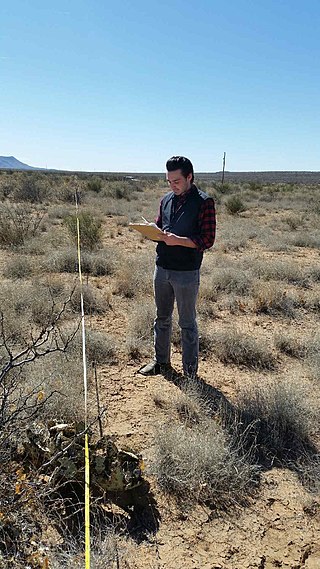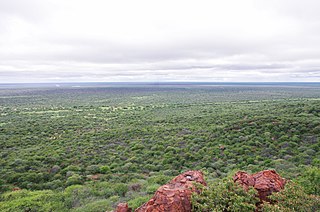Related Research Articles

A biome is a distinct geographical region with specific climate, vegetation, and animal life. It consists of a biological community that has formed in response to its physical environment and regional climate. Biomes may span more than one continent. A biome encompasses multiple ecosystems within its boundaries. It can also comprise a variety of habitats.

A savanna or savannah is a mixed woodland-grassland ecosystem characterised by the trees being sufficiently widely spaced so that the canopy does not close. The open canopy allows sufficient light to reach the ground to support an unbroken herbaceous layer consisting primarily of grasses. According to Britannica, there exists four savanna forms; savanna woodland where trees and shrubs form a light canopy, tree savanna with scattered trees and shrubs, shrub savanna with distributed shrubs, and grass savanna where trees and shrubs are mostly nonexistent.
Regime shifts are large, abrupt, persistent changes in the structure and function of ecosystems, the climate, financial systems or other complex systems. A regime is a characteristic behaviour of a system which is maintained by mutually reinforced processes or feedbacks. Regimes are considered persistent relative to the time period over which the shift occurs. The change of regimes, or the shift, usually occurs when a smooth change in an internal process (feedback) or a single disturbance triggers a completely different system behavior. Although such non-linear changes have been widely studied in different disciplines ranging from atoms to climate dynamics, regime shifts have gained importance in ecology because they can substantially affect the flow of ecosystem services that societies rely upon, such as provision of food, clean water or climate regulation. Moreover, regime shift occurrence is expected to increase as human influence on the planet increases – the Anthropocene – including current trends on human induced climate change and biodiversity loss. When regime shifts are associated with a critical or bifurcation point, they may also be referred to as critical transitions.
Simon Asher Levin is an American ecologist and the James S. McDonnell Distinguished University Professor in Ecology and Evolutionary Biology and the director of the Center for BioComplexity at Princeton University. He specializes in using mathematical modeling and empirical studies in the understanding of macroscopic patterns of ecosystems and biological diversities.

In ecology, resilience is the capacity of an ecosystem to respond to a perturbation or disturbance by resisting damage and subsequently recovering. Such perturbations and disturbances can include stochastic events such as fires, flooding, windstorms, insect population explosions, and human activities such as deforestation, fracking of the ground for oil extraction, pesticide sprayed in soil, and the introduction of exotic plant or animal species. Disturbances of sufficient magnitude or duration can profoundly affect an ecosystem and may force an ecosystem to reach a threshold beyond which a different regime of processes and structures predominates. When such thresholds are associated with a critical or bifurcation point, these regime shifts may also be referred to as critical transitions.

Stephen Russell Carpenter is an American lake ecologist who focuses on lake eutrophication which is the over-enrichment of lake ecosystems leading to toxic blooms of micro-organisms and fish kills.
A social-ecological system consists of 'a bio-geo-physical' unit and its associated social actors and institutions. Social-ecological systems are complex and adaptive and delimited by spatial or functional boundaries surrounding particular ecosystems and their context problems.

Carl Folke, is a trans-disciplinary environmental scientist and a member of the Royal Swedish Academy of Sciences. He is a specialist in economics, resilience, and social-ecological systems, viewing such systems as intertwined and potentially unexpected in their interactions. As a framework for resource management, this perspective brings important insights to environmental management, urban planning, and climate adaptation. He suggests ways to improve our ability to understand complex social-ecological interactions, deal with change, and build resilience, often working at smaller scales as a step towards addressing larger scales.

Distinguished Professor David Lindenmayer,, is an Australian scientist and academic. His research focuses on the adoption of nature conservation practices in agricultural production areas, developing ways to improve integration of native forest harvesting and biodiversity conservation, new approaches to enhance biodiversity conservation in plantations, and improved fire management practices in Australia. He specialises in large-scale, long-term research monitoring programs in south-eastern Australia, primarily in forests, reserves, national parks, plantations, and on farm land.
Dr. Margaret Hilda Friedel is an Australian rangeland ecology and management researcher, widely cited nationally and internationally for her work on the concept of ecosystem thresholds and her collaborative research with landholders and communities in outback Australia to foster understanding of the nature of rangeland ecosystems and how to balance commercial production with maintenance of a fragile resource base.

Rangeland management is a natural science that centers around the study of rangelands and the "conservation and sustainable management [of Arid-Lands] for the benefit of current societies and future generations". Range management is defined by Holechek et al. as the "manipulation of rangeland components to obtain optimum combination of goods and services for society on a sustained basis".

Diana Harrison Wall was an American environmental scientist and soil ecologist. She was the founding director of the School of Global Environmental Sustainability, a distinguished biology professor, and senior research scientist at the Natural Resource Ecology Laboratory at Colorado State University. Wall investigated ecosystem processes, soil biodiversity and ecosystem services. Her research focused on the Antarctic McMurdo Dry Valleys and its Wall Valley was named after her. Wall was a globally recognized leader and speaker on life in Antarctica and climate change.
Jamuna Sharan Singh is an Indian ecologist, academic and a former professor of botany and ecological sciences at Banaras Hindu University. He is known for his studies on the grassland ecosystems which are reported to have assisted in the better management of tropical grasslands. He is an elected fellow of the Indian National Science Academy, Indian Academy of Sciences, The World Academy of Sciences and the National Academy of Sciences, India. The Council of Scientific and Industrial Research, the apex agency of the Government of India for scientific research, awarded him the Shanti Swarup Bhatnagar Prize for Science and Technology, one of the highest Indian science awards, in 1980, for his contributions to biological sciences.

Woody plant encroachment is a natural phenomenon characterised by the increase in density of woody plants, bushes and shrubs, at the expense of the herbaceous layer, grasses and forbs. It predominantly occurs in grasslands, savannas and woodlands and can cause regime shifts from open grasslands and savannas to closed woodlands. The term bush encroachment refers to the expansion of native plants and not the spread of alien invasive species. It is thus defined by plant density, not species. Woody encroachment is often considered interpreted as a symptom of land degradation. The phenomenon is observed across different ecosystems and with different characteristics and intensities globally.

Leonard James Webb was a widely awarded Australian ecologist and ethnobotanist who was the author or joint-author of over 112 scientific papers throughout the course of his professional career. His pioneering work as Senior Principal Research Scientist alongside Geoff Tracey in the CSIRO Rainforest Ecology Research Unit in the 1950s led to the publication of the first systematic classification of Australian rainforest vegetation in the Journal of Ecology in 1959.
Mark Westoby is an Australian evolutionary ecologist, emeritus professor at Macquarie University, and a specialist in trait ecology.
Sander Ernst van der Leeuw is an archaeologist, historian, academic, and author. He is an Emeritus Foundation Professor of Anthropology and Sustainability, Director Emeritus of the Julie Ann Wrigley Global Institute of Sustainability, and the Founding Director of School of Human Evolution and Social Change at Arizona State University.

Elisabeth Huber-Sannwald is an Austrian researcher specializing in ecosystem ecology. She is a Full Research Professor in Ecology and Global Environmental Change as well as the Department Head of Instituto Potosino de Investigación Científica y Tecnológica (IPICYT) in San Luis Potosí, Mexico.
Timon McPhearson is an American urban ecologist, researcher, academic and author. He is Professor of Urban Ecology at The New School and the founder and director of its Urban Systems Lab. McPhearson is known for his interdisciplinary research on the interacting social-ecological-technological processes that drive urban system dynamics and impact human well-being. He is a Research Fellow at the Cary Institute of Ecosystem Studies and Stockholm Resilience Centre. McPhearson received the 2023 Sustainability Science Award from the Ecological Society of America.
References
- 1 2 3 "Dr Brian Walker: resilience and sustainability". Stockholm Resilience Group. 5 September 2001. Retrieved 5 February 2019.
- ↑ "Past Recipients of the Gold Medal of the Ecological Society of Australia". Ecological Society of Australia. Retrieved 5 February 2019.
- ↑ "Blue Planet Prize". 13 June 2018. Retrieved 5 February 2019.
- ↑ "Brian Harrison Walker, Media Notes, Officer (AO) in the General Division of The Order of Australia, Australia Day 2020 Honours List" (PDF). The Governor-General of the Commonwealth of Australia. 26 January 2020. p. 57. Archived (PDF) from the original on 25 January 2020. Retrieved 26 January 2020.